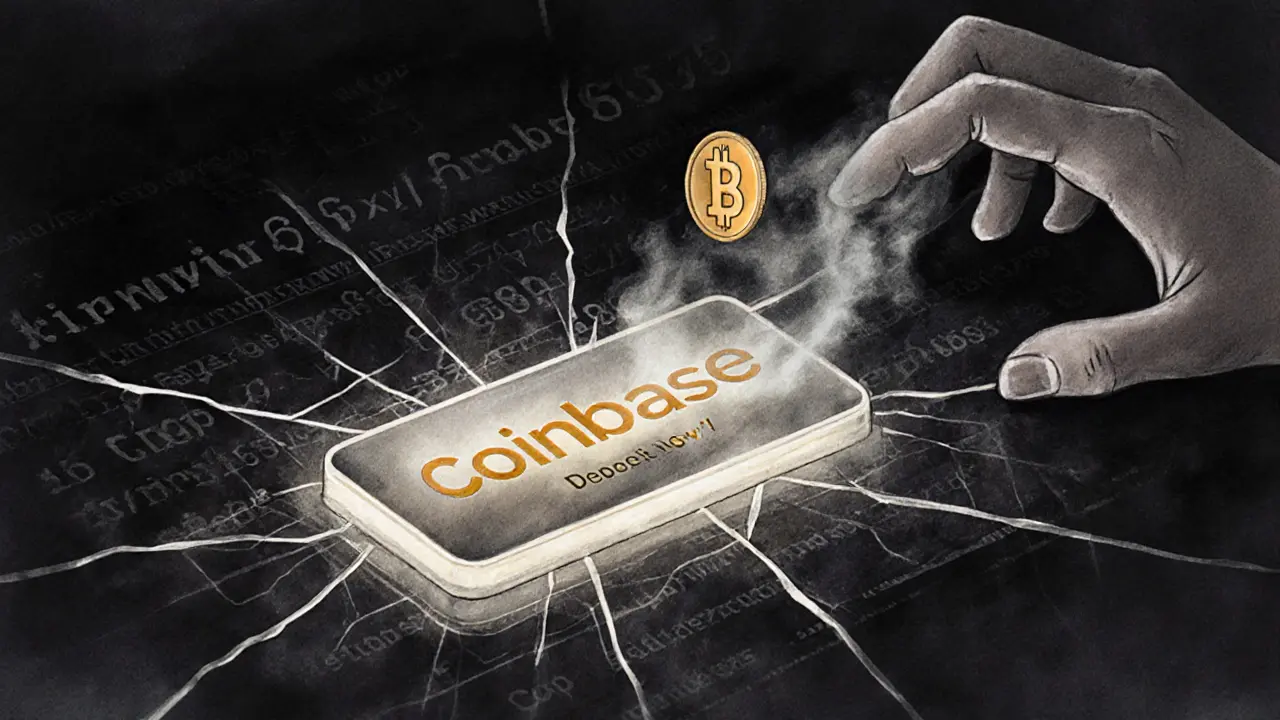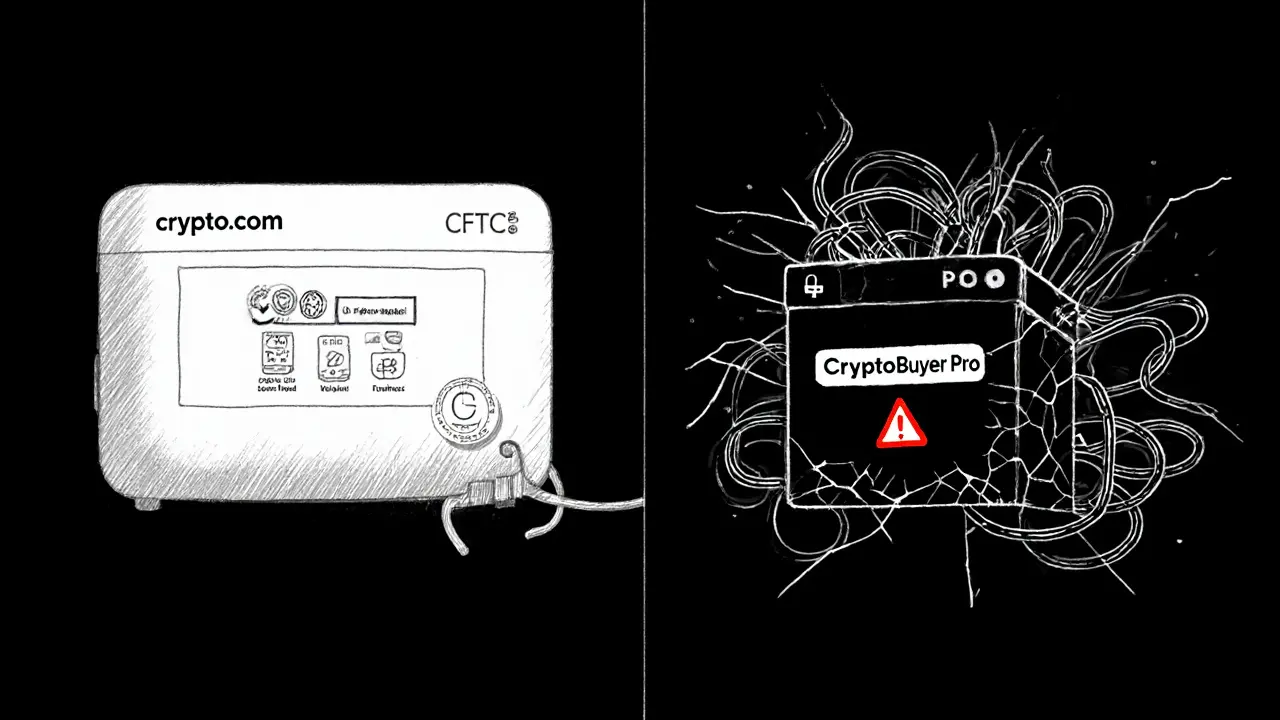Cryptobuyer Pro Crypto Exchange Review: Avoid This Scam

Crypto Exchange Scam Checker
Is This Exchange Legitimate?
Check if a crypto platform matches known scam patterns. Based on the Cryptobuyer Pro scam analysis.
Recommendation:
If you're looking at Cryptobuyer Pro as a place to buy or trade crypto, stop. This isn't a real exchange. It's a scam. And if you’ve already sent money there, you’re not alone-thousands of people fall for this exact setup every year. There’s no official website, no licensed team, no regulatory oversight. Just a bunch of fake domains designed to look real long enough to steal your funds.
What Cryptobuyer Pro Actually Is
Cryptobuyer Pro doesn’t exist as a legitimate business. It’s a name used by fraudsters to trick people into depositing cryptocurrency. The domains linked to it-like h5.trade56535.xyz, h5.trade53971.top, and h5.internationalue.com-are all flagged by Cryptolegal.uk, one of the most trusted databases of global crypto scams. These sites look professional. They have fake testimonials, polished graphics, and even fake customer support chats. But none of it’s real.
Legitimate crypto exchanges don’t hide behind random domain names. They have registered companies, public offices, and clear legal compliance. Crypto.com, Coinbase, Kraken, and Bybit are all publicly listed or regulated by financial authorities. Cryptobuyer Pro? No registration. No address. No contact details that lead anywhere. Just a website that vanishes after you send your money.
How the Scam Works
The pattern is always the same. You land on a site that promises low fees, instant trades, and huge bonuses-like ‘deposit $500, get $100 free!’ or ‘trade with 100x leverage.’ The interface looks just like Coinbase or Binance. You create an account. You deposit Bitcoin or Ethereum. Then you can’t withdraw. The site goes dark. Or worse, someone reaches out claiming to be a ‘recovery agent’ who can get your money back-for a fee. That’s the second scam. You pay them. And you lose everything again.
The Federal Trade Commission reported $5.6 billion lost to crypto scams in 2023. Over 90% of those were investment scams like this. Cryptobuyer Pro fits the exact profile: fake platform, fake promises, fake recovery offers. The Massachusetts Attorney General’s Office warns that these scammers often reuse old domains under new names. So if you see Cryptobuyer Pro shut down, don’t assume it’s gone. It’ll just pop up as CryptoBuyerPro2025 or CryptoBuyerPro-X.
What Legitimate Exchanges Do Differently
Compare this to platforms like Crypto.com. They’re listed on major stock exchanges. They report their fees publicly: 0.25%-0.08% for makers, 0.50%-0.18% for takers. They’re regulated by the CFTC. They have real customer service teams you can call. They even offer sign-up bonuses you can verify through official affiliate links.
Bybit offers futures trading with 100x leverage and 1% margin requirements. Binance gives you a 25% discount on trading fees if you pay with BNB. These are transparent, documented features. You can check them on their official websites, read them in their help centers, or find them in third-party reviews from Money.com or Coinspeaker.
Cryptobuyer Pro has none of this. No fee schedule. No security audits. No KYC process you can verify. No terms of service you can read. Just a blank page with a deposit button.

Red Flags You Can’t Ignore
- No company registration-Check WHOIS records. If the domain is registered to a private person in a foreign country with no business license, run.
- Unrealistic bonuses-‘Get $500 free for $100 deposit’? That’s not a promotion. That’s a trap.
- Only crypto deposits-Legit exchanges let you deposit via bank transfer, debit card, PayPal. Scams only take crypto, so they can disappear instantly.
- No mobile app on official stores-If Cryptobuyer Pro has an app, it’s not on Google Play or Apple App Store. It’s a direct APK download. That’s a huge red flag.
- Pressure tactics-‘Limited time offer!’ ‘Your account will be frozen!’ These are classic scam triggers.
What to Do If You’ve Already Lost Money
If you’ve sent crypto to Cryptobuyer Pro or any similar site, don’t panic. But don’t fall for recovery scams either. The first thing to do is stop all communication. Block every number, email, and Telegram account linked to them.
Report it. Use Cryptolegal.uk’s reporting tool. Email them at [email protected] with the domain name, transaction hashes, and screenshots. They track these scams and help law enforcement.
You can also file a complaint with your country’s consumer protection agency. In the U.S., that’s the FTC. In New Zealand, it’s the Commerce Commission. Even if you don’t get your money back, reporting helps shut these operations down before they hurt someone else.
And don’t waste money on so-called ‘crypto recovery services.’ They’re 99% fake. They’ll ask for a ‘processing fee’ in Bitcoin or Ethereum. Then they’ll vanish. You’ve already been scammed once. Don’t get scammed again.

Safe Alternatives to Cryptobuyer Pro
If you want to buy crypto safely, stick with platforms that have been around for years and are regulated. Here are three you can trust:
- Crypto.com-Beginner-friendly app, high liquidity, CFTC-regulated derivatives. Offers $50 sign-up bonus through verified links.
- Coinsbase-Publicly traded on NASDAQ (ticker: COIN). Strong security, insured custody, easy fiat on-ramps.
- Bybit-Low fees (as low as 0.1%), 100x leverage, transparent fee structure, widely used by experienced traders.
All three have clear websites, published terms of service, 24/7 support, and real company addresses. You can Google their names and find news articles, SEC filings, or YouTube reviews from trusted creators like Coin Bureau or Benjamin Cowen.
Final Warning
Cryptobuyer Pro isn’t a risky exchange. It’s a criminal operation. There’s no middle ground. No ‘maybe it’s legit.’ If you see it advertised on TikTok, Instagram, or a YouTube ad, it’s a scam. If someone DMs you saying ‘I made $10K with Cryptobuyer Pro,’ they’re either lying or part of the scheme.
Real crypto investing is hard enough without adding fake platforms into the mix. Don’t risk your savings on a name that doesn’t appear on any official list of exchanges in 2025. Not on Money.com. Not on Coinspeaker. Not on CoinGecko. Not anywhere real.
Stick to the names everyone knows. Use wallets you control. Never trust a platform that asks you to deposit first and explains its rules later. If it sounds too good to be true, it is. And Cryptobuyer Pro? It’s the definition of that phrase.
Is Cryptobuyer Pro a real crypto exchange?
No, Cryptobuyer Pro is not a real crypto exchange. It’s a scam operation using fake websites to steal cryptocurrency. No legitimate financial regulator recognizes it, and it doesn’t appear on any trusted exchange rankings from 2025. Domains linked to it are listed on Cryptolegal.uk’s database of fraudulent crypto platforms.
Why do people fall for Cryptobuyer Pro?
People fall for it because the websites look professional. They copy the design of real exchanges like Coinbase or Binance, use fake testimonials, and promise high returns or free bonuses. Scammers also use social media ads and influencer-style posts to build trust. Once you deposit crypto, they lock your account or disappear.
Can I get my money back if I sent crypto to Cryptobuyer Pro?
Recovering funds from Cryptobuyer Pro is extremely unlikely. Crypto transactions are irreversible. The best step is to report the scam to Cryptolegal.uk or your local consumer protection agency. Avoid ‘recovery services’-they’re almost always scams too and will ask for more crypto to ‘unlock’ your funds.
What are the safest crypto exchanges in 2025?
The safest exchanges in 2025 are Crypto.com, Coinbase, Kraken, and Bybit. These platforms are regulated, have public company structures, list fees transparently, and offer verified customer support. They’re also listed on major financial news sites like Money.com and Coinspeaker.
How can I spot a crypto scam before I lose money?
Check if the platform is listed on trusted review sites. Look for a physical address, regulatory licenses, and official app store listings. Avoid sites that only accept crypto deposits, promise unrealistic returns, or pressure you to act fast. If you can’t find a clear Terms of Service or Privacy Policy, walk away.


Johanna Lesmayoux lamare
November 12, 2025 AT 13:28I lost $800 to a site just like this last year. I thought I was being smart until I couldn't log in. No one helped. No one even replied. Just silence. Don't let anyone tell you it's 'your fault' for getting greedy-it's their fault for making it look real.
Stay safe out there.
ty ty
November 13, 2025 AT 16:48Of course it's a scam. The domain ends in .xyz. That’s like naming your restaurant ‘Taco Bell 2.0’ and expecting people to show up. You don’t need a degree in crypto to know that. You just need to not be an idiot.
BRYAN CHAGUA
November 15, 2025 AT 04:53This is exactly the kind of breakdown every new investor needs. Too many people are lured in by flashy interfaces and fake testimonials, thinking they’re getting in on the ground floor. The truth is, legitimate platforms don’t need to hide. They don’t need to pressure you. They don’t need to vanish after you deposit.
Thank you for laying this out so clearly. It’s not just about money-it’s about protecting people who are just trying to learn.
Debraj Dutta
November 16, 2025 AT 13:42Very informative. I shared this with my cousin in Delhi who was about to deposit into a similar platform. He didn’t believe me until he checked the WHOIS records. Now he’s using CoinSwitch. Good work documenting the red flags so thoroughly.
tom west
November 18, 2025 AT 02:25Let’s be brutally honest: if you didn’t recognize this as a scam, you have no business touching crypto. This isn’t a ‘risk’-it’s a trap designed for people who can’t read a website’s footer. The fact that people still fall for this in 2025 is a national embarrassment. No one forced you to click. No one held a gun to your head. You chose to ignore every warning sign because you wanted a shortcut. Now you’re broke. Cry about it. But don’t act like the system failed you. You failed yourself.
dhirendra pratap singh
November 18, 2025 AT 10:41OMG I KNEW IT!! I told my friend Sarah last week ‘DON’T DO IT’ and she said ‘but the chatbot was so nice!’ 😭 Now she’s crying in a Telegram group begging for help. And guess what? The ‘recovery agent’ just asked for 0.5 BTC to ‘unlock’ her wallet. She sent it. She’s now out $1,200. This is not a scam. This is a CRIME. Someone needs to burn these websites down. 🚨🔥
Ashley Mona
November 18, 2025 AT 19:07Love this post. I’ve been warning people on Reddit for months-crypto scams are the new pyramid schemes, but with better UIs. The real danger? They’re not targeting just beginners anymore. I’ve seen PhDs get taken. Why? Because the sites look like Bloomberg Terminal meets Apple.
Pro tip: if the ‘support’ chat replies in under 12 seconds, it’s a bot. Real teams don’t operate like that. And if they don’t list their legal entity? Run. Don’t walk.
Also-Crypto.com’s bonus? Totally legit. I got mine in 3 days. No drama. Just cold, hard crypto.
Suhail Kashmiri
November 20, 2025 AT 09:14Bro why are you even writing this? Everyone knows this stuff. The only people who fall for this are the ones who think ‘blockchain’ means ‘magic internet money.’ You can’t fix stupid. Just block the domains and move on.
Kristin LeGard
November 20, 2025 AT 19:31USA needs to ban these fake domains. Why is the government letting this happen? We police fake pharmacies and counterfeit meds-why not fake crypto platforms? It’s literally theft. And these scammers are outside the country? So what? We can pressure the WHOIS registrars. We can blacklist the IPs. We have the power. Why aren’t we using it?
Arthur Coddington
November 22, 2025 AT 03:01It’s funny how we call it a ‘scam’ like it’s some isolated evil. But really-it’s just capitalism with the mask off. We’ve trained people to chase quick wins. We glorify ‘hustle culture.’ We celebrate people who ‘get rich overnight.’ So of course they’re going to fall for a site that promises $100 free for $50. We built the cage. They’re just trying to escape it. And now we blame them for being hungry?
Phil Bradley
November 22, 2025 AT 11:18I’ve seen this exact thing happen to my uncle. He thought he was investing in the future. Instead, he lost his retirement fund. I showed him this post and he finally understood. He cried. I cried. We need more of this. Not just warnings-but stories. Real ones. So people don’t feel alone when they’re scammed.
Stephanie Platis
November 22, 2025 AT 22:35It’s important to note: the domain ‘h5.trade56535.xyz’ was registered on March 14, 2024, via Namecheap’s private registration service-this is a hallmark of fraudulent activity. Additionally, the SSL certificate was issued by a non-trusted CA (Let’s Encrypt, but with a newly minted domain), which is common in short-lived scams. The absence of an imprint page (required in the EU) and the lack of a physical address in the WHOIS record are further legal red flags. This isn’t just unethical-it’s illegal under multiple statutes.
Michelle Elizabeth
November 23, 2025 AT 06:40They make it look so beautiful, don’t they? Like a luxury watch ad-gleaming, polished, whispering promises of wealth. But underneath? Plastic. Cheap. Designed to break after one use. I used to work in UX-I know how they do it. The fonts, the color gradients, the hover animations… all engineered to make you feel safe. It’s art. And it’s horrifying.
Joy Whitenburg
November 24, 2025 AT 20:18ok so i just lost my whole crypto stash to something called crypto buyer pro (or was it pro buyer crypto??) and i was like… wait is this real?? and then i found this post and i was like OH MY GOD THANK YOU. i feel less alone now. also i misspelled everything but u get the point 😭
Kylie Stavinoha
November 25, 2025 AT 08:36What strikes me most isn’t the fraud-it’s the cultural vacuum that allows it to thrive. In societies where financial literacy is treated as optional, and where the myth of the ‘self-made millionaire’ is worshipped, scams like this become inevitable. We don’t need more warnings. We need systemic education. We need to teach children how to read terms of service, how to verify domains, how to question urgency. This isn’t about crypto. It’s about how we prepare-or fail to prepare-our next generation for a world where trust is manufactured, not earned.
And until we do that, the next Cryptobuyer Pro will just wear a different mask.